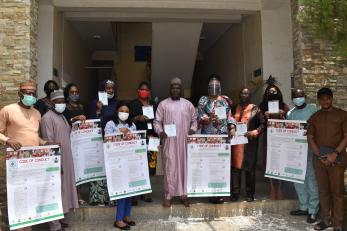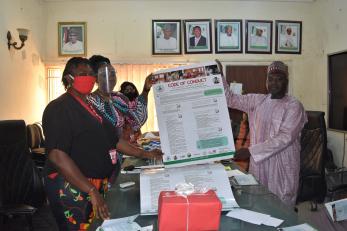NMEC adopts ENGINE Code of Conduct for Non-Formal Education

Tuesday, June 30, 2020, marked a great day for Mercy Corps Nigeria, as the National Commission for Mass Literacy, Adult and Non-Formal Education (NMEC) made good on their promise to adopt the ENGINE II Code of Conduct for use in Non-Formal Education centers managed by the Agency for Mass Education across the 36 States of Nigeria.
The code of conduct is one of the teaching and learning materials developed by the commission with support from ENGINE II to improve the delivery of adult and non-formal education in Nigeria. The documents were officially handed over to NMEC in a handover ceremony through the Executive Director, Prof. Abba Abubakar Haladu, who noted that the commission has begun the process of translating the document into Hausa, Igbo, and Yoruba language for ease of use by out-of-school learners. According to Prof. Haladu, “Although unwritten codes of conduct exist in NFE centers nationwide, this is the first time codes are formalized, vetted and written down to allow for wider coverage and maximum usage.”
This came at a good time as the Educating Nigerian Girls in New Enterprises (ENGINE) II program is closing out in September 2020. The program's main goal is to improve learning outcomes amongst marginalized girls to help fulfill their potential for education and work, with a focus on achieving key outcomes centered on learning, transition, and sustainability.
The ENGINE II program aims to transform the lives of marginalized Nigerian girls by fulfilling their potential in education and work. The program theory of change is two-fold. First, the program assumes that in-school girls will successfully transition to the next phase of education or complete their current education cycle and enter the workforce through enhanced learning experiences and an improved enabling environment. Second, the program assumes that with the right support mechanisms in place, girls whose schooling has been interrupted out-of-school girls will have the opportunity to build their functional literacy and numeracy skills, while building assets and diversifying income sources. In doing so, girls will place themselves on a path to greater success and transition to employment and demand-driven entrepreneurship opportunities.
The codes set out the standard, rules, and regulations by which Non-Formal Education centers should operate in order to regulate learning and provide a safe and conducive environment for learning, free of any threat to sexual, physical, or psychological abuse. With reports that learning outcomes are often poorest for out-of-school girls, the codes serve as a great tool for improving learning for out-of-school girls.
Commonly used informal learning centers in Nigeria include town halls, mosques, churches, palaces, market stalls, and tree shades. Some of these spaces are oftentimes donated for use by community members in a show of their support and cooperation to provide education for their youths. As the intended use for these spaces is not originally suited for learning, it was important to apply certain guidelines to safeguard learners and ensure they had a conducive environment to learn.
“One of the things we looked out for is, how can we improve learning and teaching, and ensure that girls have a say in decisions affecting their lives. We work with girls that have never been to school before, we want to make sure that wherever they find themselves learning, those places are safe,” says Abiose Haruna, ENGINE Program Manager, Implementation.

Special appreciation goes to the leadership of NMEC for partnership and taking the lead on the reviews, expansion of production and distribution of the documents, and Tabitha Cumi Foundation, ENGINE II FCT Implementing partner for supporting the process.
“Our aim was 4 states, but with the NMEC structure, we are going around the country, that’s really above and beyond what we envisage. For every program implemented by donors, what they always look for is the sustainability of the program. Donor funds are for a limited period of time. We want to see all the gains and objectives of the program be sustained whether donors are there or not, that’s why we leverage on government structures,” Abiose added while thanking the NMEC team for their commitment and support.
Prof. Haladu acknowledged the role of the Department for International Development (DFID), Mercy Corps and Tabitha Cumi Foundation and noted that the commission is always ready to work with partners, saying “We always tell partners to come to us at the beginning of any program and we will give our technical input into how best it can be implemented.”
About ENGINE II program
Educating Nigerian Girls in New Enterprises (ENGINE) II is a three and half year (April 2017 – September 2020) Adolescent Girls’ Education Program funded by the UK Department for International Development (DFID) through its Girls’ Education Challenge (GEC) Fund. Mercy Corps leads the implementation of ENGINE II in Nigeria, along with Society for Women Development and Empowerment of Nigeria (SWODEN) in Kano, Action Health Incorporated (AHI) in Lagos, Kindling Hope Across Nations Initiative (KHAN) in Kaduna and Tabitha Cumi Foundation (TCF) in the Federal Capital Territory.